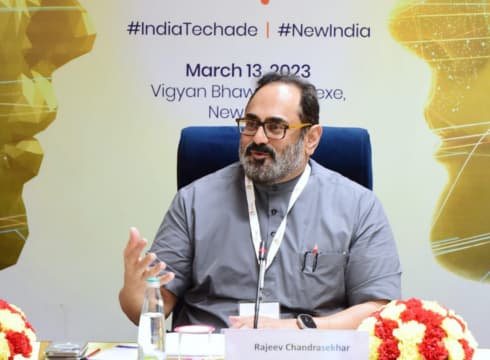Social media platforms and online portals can lose their intermediary status for non-compliance with PIB directives: MoS Rajeev Chandrasekhar
However, the government is unlikely to give any content take down powers to the PIB
A day ago, I&B Minister Anurag Thakur told the Parliament that the PIB’s fact-check unit is responsible for monitoring fake news online
Inc42 Daily Brief
Stay Ahead With Daily News & Analysis on India’s Tech & Startup Economy
After much back and forth, the Centre has reportedly sped up plans to bring in rules that would empower the Press Information Bureau (PIB) with powers to flag ‘inaccurate and fake news’ related to government bodies on social media platforms.
Without specifying a timeline, Minister of State (MoS) for Electronics and Information Technology (MeitY) Rajeev Chandrasekhar told The Economic Times that a notification in this regard can be expected soon.
However, the government is unlikely to give any content take down powers to the PIB.
To enforce the norms, the government is looking to make provisions under which social media platforms and online portals can lose their intermediary status for non-compliance with the PIB directives. Losing the status can make these platforms liable for legal action by aggrieved parties as publishers of content.
“Any intermediary that does not comply with one or any of the due diligence obligations under IT rules will lose their immunity status as rule 7 will apply…So any dispute on misinformation or any other clause will be a direct dispute between aggrieved person and Platform in a court,” Chandrasekhar added.
This comes a day after the Minister of Information and Broadcasting Anurag Thakur told the Parliament that the government is aware of the circulation of fake news on multiple social media platforms. In a written reply, he also informed the House that the government’s fact check unit is responsible for monitoring fake news by way of queries submitted through its portal, email or social media handles.
Caught In The Eye Of The Storm
The government invited the ire of digital advocacy groups and other activists after it proposed new amendments to the IT Rules, which stated that intermediaries will have to mandatorily take down content tagged as ‘fake’ by the fact-check unit of the PIB.
Editors’ body Editors Guild of India said that the proposed norms would lead to government censorship. Subsequently, the Centre withdrew the proposed amendments and called for a fresh round of consultations in the matter.
Last month, Chandrasekhar reaffirmed that the PIB will be the nodal body for fact checking when it comes to verifying government-related news. For non-government news, the Centre plans to establish a self regulatory organisation (SRO). The industry will be tasked with creating a framework for a trusted network of fact checkers that the self-regulatory body can rely on and to allay the concerns about government interference.
In the past one year, the Centre has introduced multiple new Bills to regulate the Indian digital landscape. From the Telecommunications Bill to the proposed online gaming norms, the government has been on a blitzkrieg when it comes to introducing norms. However, the biggest of them appears to be the upcoming Digital India Bill that is likely to introduce a host of reforms.
{{#name}}{{name}}{{/name}}{{^name}}-{{/name}}
{{#description}}{{description}}...{{/description}}{{^description}}-{{/description}}
Note: We at Inc42 take our ethics very seriously. More information about it can be found here.


